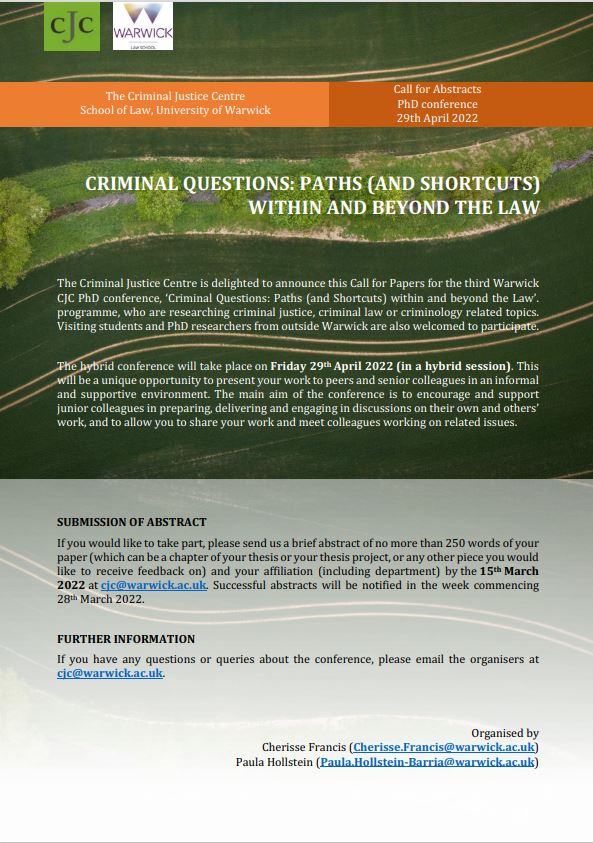News
Call for papers: Conference on the Global Travels of Knowledge on the Criminal Question (1850/1950).
|The Max Planck Institute for Legal History and Legal Theory and the Crime and Society Program, Universidad Nacional del Litoral will be hosting an international conference on the Global Travels of Knowledge on the Criminal Question (1850/1950) on September 8-9 2022.
The conference will be hybrid and there will be simultaneous translation allowing for either English or Spanish presentations.
Paper proposals Paper proposals can be written in Spanish or English and must have a maximum length of two pages, including the title, abstract and basic academic data of the author(s) – place of work, research project in which it is inscribed, undergraduate and postgraduate training, etc.
The deadline for submitting these proposals will be May 15, 2022 and they must be sent to the email: delitoysociedad@unl.edu.ar.
The acceptance of these proposals will be communicated before May 31, 2022.
Final papers may not exceed 8000 words, including notes and references. They must be sent to the same email address by August 1, 2022 .
More details and the full call for papers can be found at this link.
'The McDonaldization of justice and the disappearance of fair trial?' Conference 19- 21 May 2022
From 19 - 21 May 2022 the 11th conference in the series The Future of Adversarial and Inquisitorial System, a collaboration between the Universities of Warwick, North Carolina, Bologna, Basel and Duke University will be hosted at Scarman House, University of Warwick.
The conference draws upon what Ritzer has described as a kind of McDonaldization of criminal justice. As the trial becomes increasingly rare, along with opportunities to challenge the reliability of evidence, the accused finds herself encouraged to make an admission at the earliest opportunity based on the information gathered during the police investigation. The presence of defence counsel at strategic points in the process lends some legitimacy, but the practices of law reflect little of the safeguards and values so celebrated in the rhetoric of both adversarial and inquisitorial-type systems. Processes are being ‘simplified’ – not in ways that make the process clear and easy to navigate – but through the removal of fundamental safeguards deemed too costly and time-consuming such as juries, judicial investigation, or any form of trial or contestation of charges. Added to this are new types of evidence, gathered in as yet unregulated ways, the nature and provenance of which require careful scrutiny if they are to form the basis of prosecution and conviction.
Several conference panels will be devoted to discussion of these themes drawing on Hodgson’s The Metamorphosis of Criminal Justice (2020, OUP). In this work, through a comparative analysis of the potentially radical and fundamental changes taking place across two contrasting jurisdictions (England and Wales, and France), she explores the ways that criminal justice traditions continue to be shaped in different ways by broader policy and political concerns, and the ways in which different systems adapt, change and distort when faced with (sometimes conflicting) pressures domestically and externally. This comparative lens also illuminates the ways that, in England and Wales and in France, different procedural values may serve to structure or limit reform, and so work to facilitate or resist change.
Thursday 19th May is devoted to presentations from Early Career Researchers. View the programme.
Attendance is free, but participants must register via email first to secure a place.
The main conference takes place on Friday 20th and the morning of Saturday 21st May. View the programmeLink opens in a new window.
All are welcome but you must register via email and there is a small charge for attendance (£35 Friday, including lunch; £25 Saturday). You are also welcome to join the conference dinner on the evening of Friday 20th May at a cost of £35.
More details including conference programmes and registration details can be found here.
Call for papers : Third Annual CJC PhD Research Conference
The Criminal Justice Centre will be hosting its third annual PhD research conference on Friday 29th April 2022.
The theme for this year is: 'Criminal Questions: Paths (and Shortcuts) within and beyond the Law'.
This one-day conference seeks to bring together PhD researchers at any stage of their programme who are interested in topics related to criminal justice, criminal law or criminology.
Submission of Abstract:
If you are interested in participting please submit an abstract of no more than 250 words to cjc@warwick.ac.uk .
When submitting this abstract include your name, institutional affiliation and department.
The deadline for submission of abstracts is 15th March 2022.
Successful applicants will be notified in the week commencing 28th March 2022.

Call for Papers: Southern Perspectives on Border Control
The European Society of Criminology will be hosting an online event from 8-11 November 2021. Border Criminologies is inviting submissions for papers to organise one or two panels within this conference.

CJC member Azrini Wahidin to give keynote at
Women's Equality Party Manchester is organising a conference titled Offending Women? Women's Journeys Through The Criminal Justice System on 6 April 2019. CJC member Azrini Wahidin will be giving a keynote at the conference. For more details, click here.
